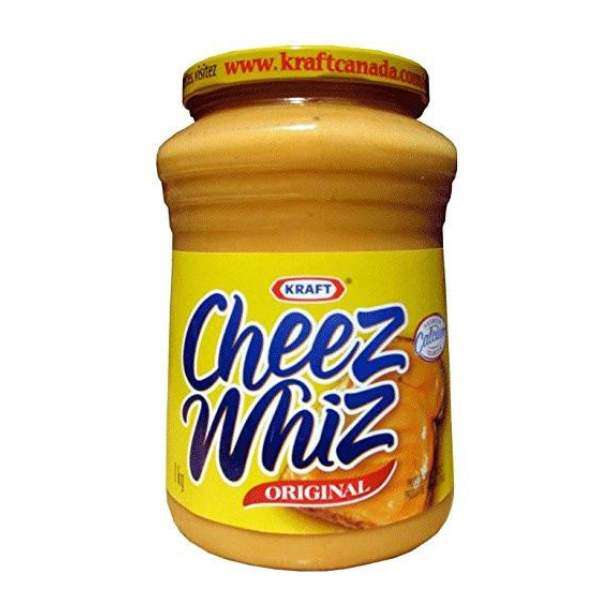No, Cheese Whiz is not recommended for dogs. While it may not be harmful in small amounts, Cheese Whiz contains high levels of sodium and artificial ingredients, which can be detrimental to a dog’s health, especially in large quantities.
Additionally, the high sodium content can lead to issues like dehydration and kidney problems in dogs. It’s best to avoid feeding Cheese Whiz to dogs and choose healthier and safer alternatives for treats and training rewards.
Potential Risks Associated with Cheese Whiz for Dogs Health

High-Fat Content: Cheese Whiz has a high fat content, which can be tough on dogs’ digestion. It may lead to digestive problems, pancreatitis, and weight gain if they eat too much of it. If your dog eats too much cheese whiz, it can cause long-term health issues.
Additives and Flavorings: Cheese Whiz contains additives, oils, and flavorings that may not be suitable for canine digestion. These ingredients can potentially cause gastrointestinal disturbances or allergic reactions in sensitive dogs.
Lactose Intolerance: Some dogs may be lactose intolerant, meaning they lack the necessary enzymes to digest lactose, a sugar found in milk products. Cheese Whiz, being a cheese-based product, contains lactose, which can lead to digestive discomfort, diarrhea, or other gastrointestinal issues in lactose-intolerant dogs.
High Sodium Content: Processed cheese products like Cheese Whiz can have a high sodium content. Excessive sodium intake can contribute to dehydration, elevated blood pressure, and kidney issues in dogs.
Best Alternatives of Cheese Whiz
When it comes to providing safe and healthy alternatives to Cheese Whiz for dogs, there are several options to consider. Here are some unique and relative alternatives that you can offer to your furry friend:
Natural Cheese: You should choose natural cheeses that have low sodium and no added seasonings or flavorings. Some examples are plain cheddar, mozzarella, or cottage cheese in small amounts.
Plain Greek Yogurt: You can give your dog plain, unsweetened Greek yogurt as a healthy option. It has good probiotics and is easier for dogs to digest. The beneficial bacteria in it can help with their digestive health.
Pumpkin Puree: Pumpkin puree, without added sugars or spices, is a great option for dogs. It is low in calories, high in fiber, and can help regulate digestion.
Carrot Sticks: Carrots are a healthy and crunchy snack for dogs. They are low in calories, high in fiber, and provide essential vitamins. Cut them into small sticks or offer them as a frozen treat for additional chewing enjoyment.
Frozen Fruit: Some fruits, such as sliced apples or seedless watermelon, can be offered as refreshing treats for dogs. Make sure to remove any seeds, pits, or cores and offer them in moderation due to the natural sugar content.
Homemade Dog Treats: Consider making homemade treats using dog-friendly ingredients like peanut butter (check for xylitol-free varieties), oats, and mashed sweet potatoes. There are numerous recipes available online that cater specifically to canine taste buds
FAQS
Why is Cheese Whiz not suitable for dogs?
Cheese Whiz is a processed cheese product that may contain additives, oils, and flavorings that can cause digestive issues and be problematic for dogs.
Can dogs be allergic to Cheese Whiz?
Some dogs can be allergic to ingredients found in Cheese Whiz, like dairy or additives. If your dog eats Cheese Whiz, you should keep an eye out for any signs of allergic reactions.
What are the risks of feeding Cheese Whiz to dogs?
Risks associated with Cheese Whiz for dogs include potential digestive upset, pancreatitis, weight gain, lactose intolerance issues, and high sodium intake.
Are there any safe alternatives to Cheese Whiz for dogs?
Yes, there are safer alternatives for dogs, such as natural cheeses in moderation, plain Greek yogurt, pumpkin puree, carrot sticks, frozen fruit, and homemade dog treats made with dog-friendly ingredients.
How should I introduce new foods to my dog’s diet?
When trying new foods, take it slowly and watch for any negative reactions in your dog. Talk to your vet for personalized advice and tips on introducing new foods into your diet.
Conclusion
You can choose many other healthy alternatives that are safe for your dog as well. You should always prioritize the health of your dog to keep it safe and healthy.
Whenever you want to add some new food to your dog, make sure you talk to the vet first or get some knowledge from the internet.
Hopefully, this article was helpful and if you want to learn more about different foods, you can visit our other articles as well. Thanks!
Happy Snacking!
